Competition Tunes
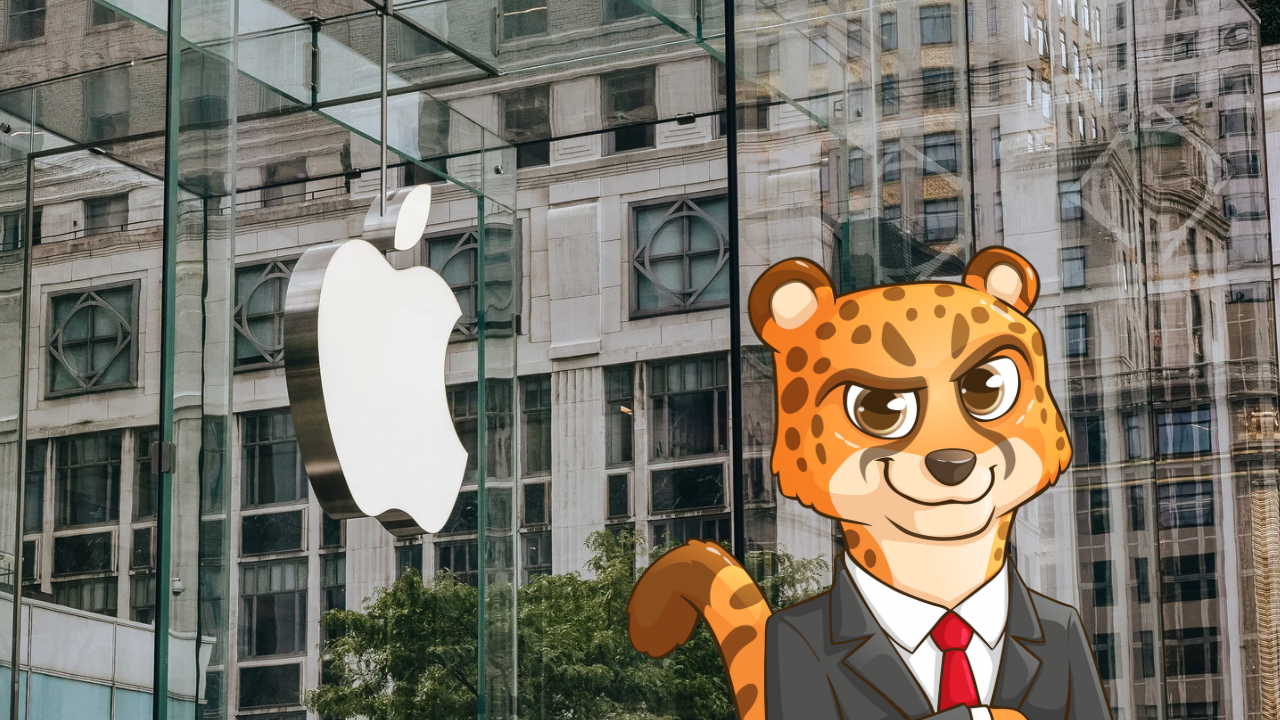
Hey this is Ziplaw! Your shot of commercial awareness caffeine with a side of memes.
Are you new here? Get free emails to your inbox.
Here's what we're serving today:
- 🍎 Apple faces a multi-billion fine
- 🚗 China is winning the EV race
- 🏎️ McLaren's F1 driver claim
zipmemo
- 🇺🇸 Supreme Court Stands with Trump: In a unanimous decision, the Supreme Court said "nope" to Colorado's attempt to drop Donald Trump from its primary ballot, citing a misinterpretation of the Fourteenth Amendment. This last-minute ruling right before Colorado's Republican primary halts similar moves by other states related to the Capitol riot.
- 🇨🇳 China's Pork Price Problem: China's rolling up its sleeves to prevent pork prices from tanking further. With the country's pig herd swelling to 434 million, making up half the world's pigs, the government's urging tighter control on herd sizes to combat deflation.
- ✈️ JetBlue and Spirit Part Ways: After nearly two years of back-and-forth, JetBlue and Spirit Airlines have called it quits on their $3.8 billion merger. The deal hit the rocks thanks to the Justice Department worrying it'd hike fares by nixing a budget-friendly flyer.
- 🇬🇧 House of Lords Checks Sunak's Move: The House of Lords put the brakes on Prime Minister Rishi Sunak's Rwanda asylum bill, insisting it aligns with both UK and international law. The amendment, pushed through by Labour's Lord Vernon Coaker, saw a significant 274 to 102 vote in favor, marking a notable pushback in the legislative process.
Apple's Fine
In Short: Apple faces a hefty €1.8 billion fine from the EU, accused of stifling competition in music streaming by disadvantaging rivals like Spotify on its platforms.
What’s going on?
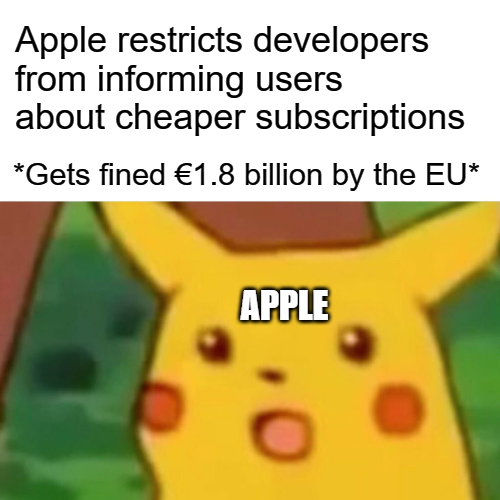
Imagine you're throwing a party and only your snacks are on the menu, even though your guests crave a variety. That's sort of what Apple's been up to, according to the EU. The tech titan has been slapped with a whopping €1.8 billion fine for playing gatekeeper a tad too strictly in its digital "party" - the App Store.
The gist of it? Apple's been nudging music-streaming competitors like Spotify out of the spotlight, making it tougher for them to offer cheaper, outside-App-Store deals to users. The penalty marks a first for Apple from the EU, sparking a stock tumble and setting the stage for what could be an epic legal showdown.
Why does it matter?
This isn't just about a big company getting a bigger fine. It's a story of David (Spotify and the likes) versus Goliath (Apple), with the EU wielding the slingshot. The crux of the matter is consumer choice and fair play in the digital marketplace. Apple's defence? A confident claim of no "credible evidence of consumer harm" and a thriving, competitive market. But the EU, particularly antitrust chief Margrethe Vestager, isn't buying it. She's on a mission to curb Big Tech's domineering antics, with Apple being the latest on her hit list.
The implications are massive. Not only does this fine put a spotlight on Apple's App Store practices, but it also echoes broader tensions between regulatory bodies and tech behemoths over market control and consumer rights. With new EU rules like the Digital Markets Act kicking in, the tech landscape in Europe is set for a shake-up, potentially redefining user freedom and competition in the digital age. As Apple gears up to contest the decision, all eyes will be on how this legal battle unfolds and what it means for the future of digital marketplaces.
⚖️ How does this impact Law Firms?
Competition and Antitrust Law:
- Compliance and Regulatory Advice: Lawyers will be advising tech companies, especially those with digital marketplaces, on navigating the complexities of EU competition laws and the newly effective Digital Markets Act. They'll be guiding these firms on how to structure their market practices to avoid penalties similar to Apple's. This involves conducting comprehensive audits of existing business practices and advising on necessary adjustments to ensure compliance, particularly in how they manage third-party access and interactions within their platforms.
- Litigation and Appeals: In light of Apple's intention to appeal the EU's decision, lawyers in this field will likely see an uptick in representing tech giants in similar legal battles. They'll be tasked with crafting robust defence strategies, challenging regulatory findings, and navigating the appeals process. This work will not only involve deep legal expertise but also a keen understanding of the tech industry's nuances and the regulatory environment.
Intellectual Property (IP) Law:
- Licensing and Agreements: Lawyers will be busy drafting and negotiating licensing agreements for music-streaming services and other app developers, ensuring they can operate within app marketplaces without infringing on intellectual property rights or falling foul of platform restrictions. This includes advising on the nuances of copyright law as it pertains to digital content and platform distribution agreements.
- IP Dispute Resolution: With the heightened scrutiny on how platforms like Apple's App Store manage access for competitors, there's potential for increased disputes around IP rights and fair use. Lawyers will represent clients in disputes over copyright infringement, trademark violations, and other IP-related conflicts within digital marketplaces, guiding them through litigation or settlement processes.
Data Protection and Privacy Law:
- Advisory on User Communication: In response to the EU's order for Apple to allow music-streaming apps to inform users of cheaper deals outside the App Store, lawyers will advise tech companies on how to communicate with users about alternative purchasing options without violating data protection laws. This involves crafting privacy-compliant communications strategies that respect user consent and data protection norms.
- Compliance with Digital Markets Act: With new regulations under the Digital Markets Act affecting how tech companies can use and share user data, lawyers will provide critical guidance on compliance. This includes advising on the lawful processing of personal data across services, ensuring that companies do not unlawfully combine user data across platforms or use third-party merchant data in a way that competes against them.
China's EV are dominating
In Short: Chinese electric vehicles (EVs) are zooming ahead in sales compared to their US and European counterparts, with industry insiders pointing to superior performance and affordability as the key drivers.
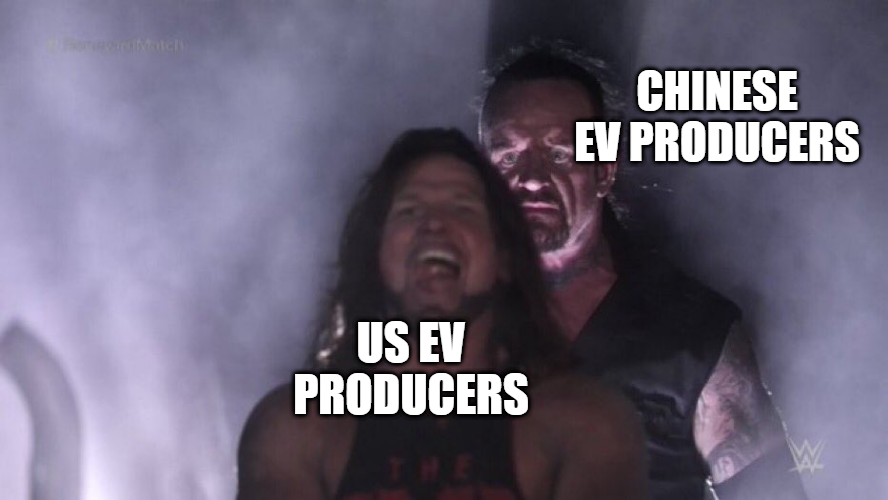
What’s going on?
Picture this: the global EV market is a racetrack, and right now, China is lapping the US. Mathias Miedreich, the big boss at Umicore (a heavyweight in battery materials), has been spilling the tea. He says Chinese EVs are simply outperforming American ones, offering better bang for the buck. Meanwhile, US carmakers are pumping the brakes on EV factory expansions due to lackluster demand.
In China, EV sales, including those nifty plug-in hybrids, have surged a whopping 36% to 7.7 million in 2023. That's a big slice of the automotive pie, with EVs making up over a third of all new cars sold there last year. On the other side of the pond, the US is playing catch-up, with EV sales jumping 58% to 1.5 million, but that's just a drop in the ocean, making up less than 10% of all new cars sold.
Chinese automaker BYD, with a little backing from Warren Buffett, has even overtaken Elon Musk's Tesla, clinching the title of the world's top EV producer. Ouch, that's got to sting for the home team.
Why does it matter?
The EV race isn't just about who's got the fastest car; it's about cracking the consumer code. For example, Americans love their rides big and beefy, which means bigger, pricier batteries. And even though most folks aren't driving cross-country on the daily, there's this thing called "range anxiety" – the fear of running out of juice on the go.
Enter solid-state batteries, the next big thing, promising longer ranges and potentially turning the tide for US automakers. But the clock's ticking, and as Miedreich points out, the market might have already picked its favourites.
Adding another twist, the US Inflation Reduction Act, with its juicy $7,500 EV tax credit, hasn't turbocharged demand as hoped. It seems good intentions can't outrun the need for, well, good products.
⚖️ How does this impact Law Firms?
Intellectual Property (IP):
- Patent Strategy and Litigation: Lawyers in the IP department will find an increased workload in crafting robust patent strategies for innovations in electric vehicle (EV) technology, particularly in battery and power systems, which are pivotal for the performance and affordability of EVs as highlighted in the story. They will advise automotive and tech companies on protecting their inventions, navigating the complex landscape of existing patents, and potentially engaging in litigation over patent infringements as competition intensifies in the global EV market.
- Trademark and Brand Protection: As new players enter the EV market and existing companies expand their product lines, there will be a surge in the need for trademark filings to protect brand identities, slogans, and logos associated with new EV models. Lawyers will assist clients in trademark registrations, monitoring for potential infringements, and enforcing IP rights against counterfeit and grey market products, especially in jurisdictions with high sales growth like China.
Environmental Law:
- Regulatory Compliance: Lawyers will advise automotive manufacturers and suppliers on compliance with environmental regulations pertaining to the production and disposal of EV batteries, including the sourcing of materials and the impact of manufacturing processes on the environment. This will include navigating international environmental standards and advising on best practices for sustainability.
- Clean Energy Incentives and Subsidies: With the shift towards EVs as part of broader environmental sustainability goals, there will be an increased demand for legal expertise in accessing government incentives, subsidies, and tax credits, such as those outlined in the US Inflation Reduction Act. Lawyers will guide companies through the qualification process, ensuring that their products and operations meet the necessary criteria to benefit from these incentives, and advise on the structuring of business operations to maximise financial and environmental benefits.
Corporate and Commercial Law:
- Joint Ventures and Strategic Alliances: As automotive companies seek to enhance their technological capabilities and market reach in the EV sector, lawyers will be heavily involved in structuring joint ventures and strategic alliances, especially between Western automotive companies and Chinese EV manufacturers who are leading in performance and affordability. This will involve complex negotiations, drafting of agreements, and advising on regulatory compliance across different jurisdictions.
- Mergers and Acquisitions (M&A): The competitive pressure and rapid growth in the EV market, as indicated by the Chinese manufacturers' success, will likely lead to increased M&A activity. Lawyers will conduct due diligence, negotiate terms, and ensure regulatory compliance for deals involving automotive companies, battery manufacturers, and tech firms, focusing on acquiring new technologies, expanding market presence, and securing supply chains for critical components like batteries.
McLaren's $31 Million Racing Rift
In Short: McLaren Racing ups the ante in its legal battle against Spanish racer Álex Palou, now seeking a whopping $31 million in damages after Palou shifted gears to join rival Chip Ganassi Racing, sidelining a prior agreement with McLaren for IndyCar racing and F1 reserve duties.
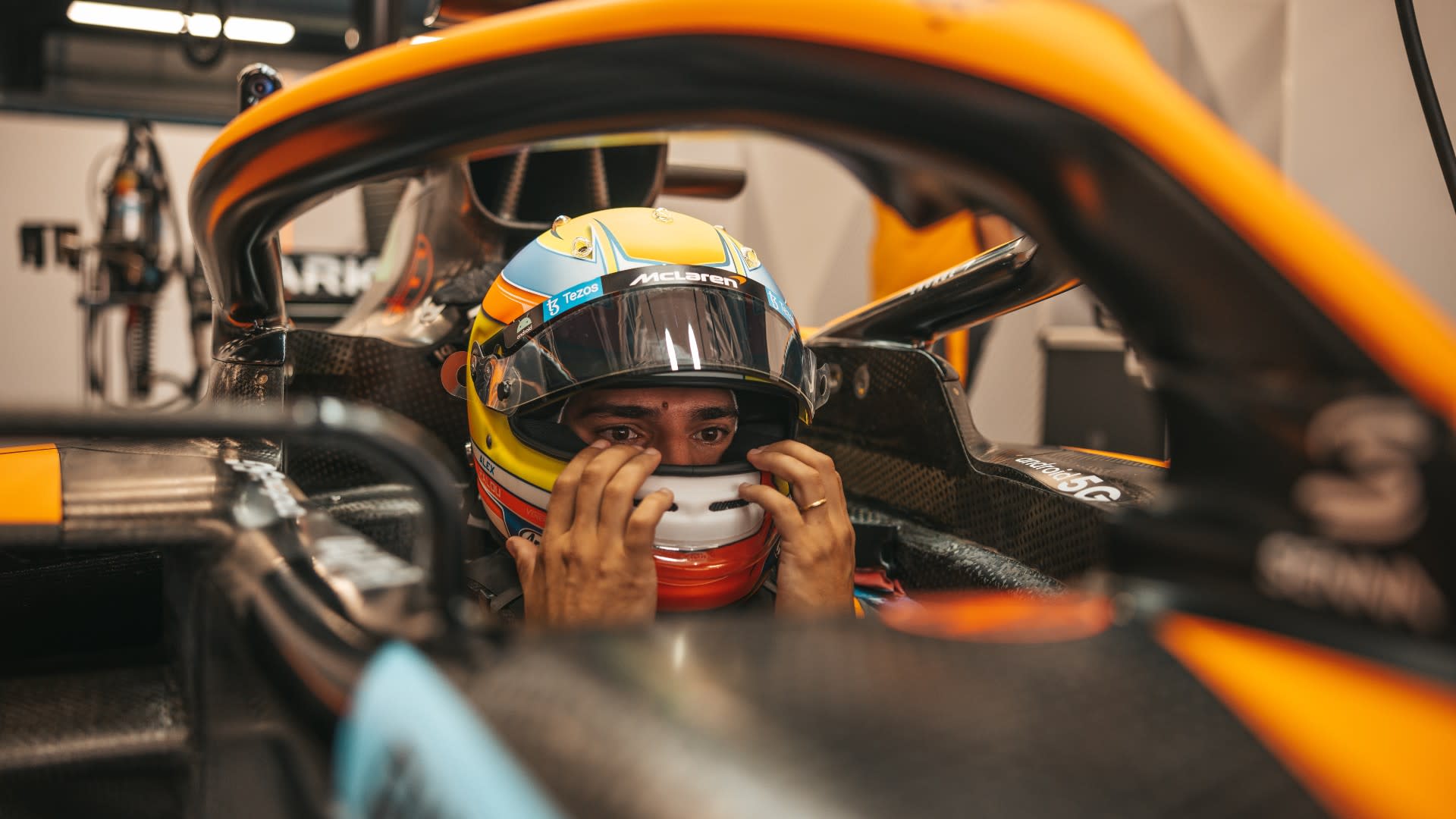
The Facts:
McLaren's beef with Palou took a sharp turn into the High Court, with claims that Palou's detour from a 2022 agreement not only blindsided the British racing giant but also throttled its financial and strategic plans. Initially pegged at $21 million, McLaren's estimate of the fallout has since revved up by $10 million, pinning losses on missed profits, squandered investments in prep resources like driving simulators, and the scramble to fill the void Palou left behind. At the heart of the dispute is a contractual tangle, with McLaren insisting that Palou and his personal service company, Alpa Racing USA LLC, reneged on a deal, prompting a high-stakes legal showdown that now also ropes in Palou Motorsport SL, a venture in which Palou himself holds a 40% stake.
What Was Each Party Arguing:
- McLaren's Argument: They're revving their legal engines on the claim that Palou's pivot to Chip Ganassi Racing was a clear breach of contract, leaving them in the lurch both financially and operationally. McLaren disputes any notion that they dangled the carrot of a full-time F1 seat, labeling such claims as "baseless".
- Palou's Defense: The driver's camp is downshifting, arguing that McLaren's damage claims are overblown and insisting that a lack of faith in McLaren's support for his F1 aspirations led to his departure. They counter that McLaren, by seeking damages, has implicitly accepted Palou's contract exit rather than demanding he fulfill his reserve driver duties.
Impact and Key Points for Discussion:
- The Fine Line of Contractual Commitments: This high-octane dispute spotlights the intricate dance between contractual obligations and personal career trajectories in the high-stakes world of motorsport. The case underscores the critical importance of clear, mutually understood agreements and the potential fallout when parties diverge on their interpretations. For aspiring legal professionals, it's a masterclass in the complexities of contract law and the importance of ensuring all parties have a shared understanding of agreements.
- Navigating Career Moves and Legal Liabilities: Palou's move raises pivotal questions about individual autonomy versus contractual fidelity in professional sports. The dispute highlights the tension between an athlete's career ambitions and the legal bindings that tether them to teams and sponsors. It's a scenario ripe for discussion on the balance between personal career advancement and the legal and ethical obligations to existing commitments.
- The Ripple Effects of Legal Disputes in Sports: Beyond the immediate parties, this case could send shockwaves through the racing world and beyond, affecting how contracts are structured, the clarity of communication between teams and athletes, and the legal strategies employed when disputes arise. The outcome could influence future contract negotiations, athlete-team relationships, and the legal landscape of sports contracts, making it a critical case study for anyone at the intersection of sports, law, and business.
Who is advising?
- McLaren Racing Ltd. and McLaren Indy LLC: Legal representation by Celia Rooney of Blackstone Chambers, instructed by Morgan Lewis & Bockius.
- Alpa Racing and Palou: Defense mounted by Nick De Marco KC and Hollie Higgins of Blackstone Chambers, with Kavan Bakhda of Kennedys Law steering the legal strategy.
👀 ZIPMEMES
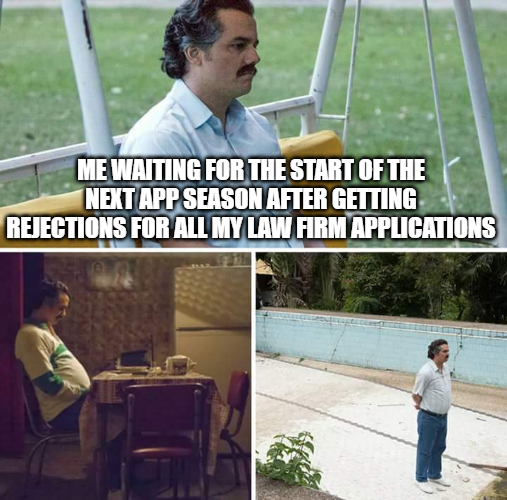
Don't forget...
🙏 Our work is reader-supported. You can get a membership for cheap!
🎥 Follow us on Instagram here or TikTok here.
📫 Forward this to a friend and tell them to subscribe (hint: it's here)
